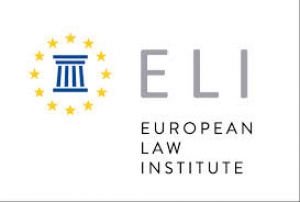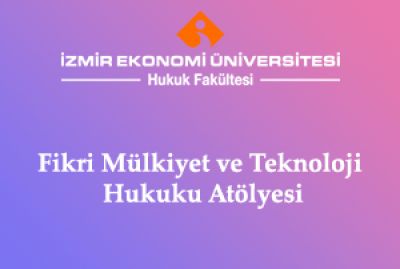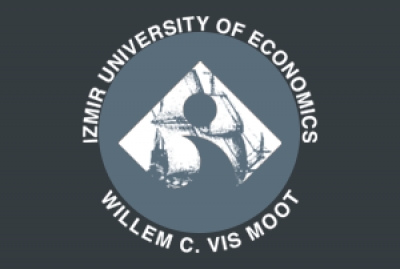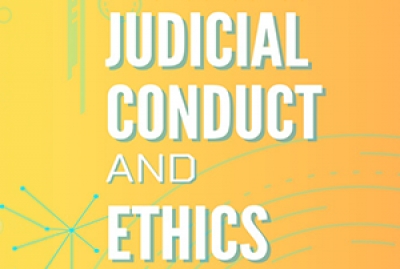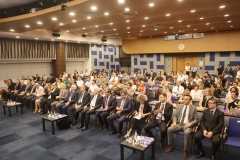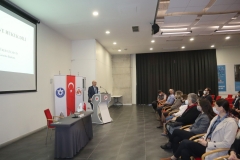
Faculty of Law
HUK 469 | Course Introduction and Application Information
| Course Name |
Information Technology (IT) Law
|
|
Code
|
Semester
|
Theory
(hour/week) |
Application/Lab
(hour/week) |
Local Credits
|
ECTS
|
|
HUK 469
|
Fall/Spring
|
3
|
0
|
3
|
4
|
| Prerequisites |
None
|
|||||
| Course Language |
Turkish
|
|||||
| Course Type |
Elective
|
|||||
| Course Level |
First Cycle
|
|||||
| Mode of Delivery | - | |||||
| Teaching Methods and Techniques of the Course | - | |||||
| Course Coordinator | ||||||
| Course Lecturer(s) | ||||||
| Assistant(s) | ||||||
| Course Objectives | Course objective is to have a general legal knowledge about principles of information technology which dominates our daily life. |
| Learning Outcomes |
The students who succeeded in this course;
|
| Course Description | Concept and types of personal data and duty to keep secret, right to Access daatas, disposing informations under freem of speech, value of personal data, commercial use of personal data, protection of personal data and role of public and private instutitons, Turkish and EU legal frameworks will be covered during this course. |
|
|
Core Courses |
X
|
| Major Area Courses | ||
| Supportive Courses | ||
| Media and Management Skills Courses | ||
| Transferable Skill Courses |
WEEKLY SUBJECTS AND RELATED PREPARATION STUDIES
| Week | Subjects | Related Preparation |
| 1 | Information technology in general, computer networks and internet | Related parts of the sources |
| 2 | Components of internet network, its functioning | Related parts of the sources |
| 3 | Administration of internet and information technology in Turkey | Related parts of the sources |
| 4 | Subjects of the internet | Related parts of the sources |
| 5 | IT, internet and law | Related parts of the sources |
| 6 | Code no. 5237 and cyber crimes | Related parts of the sources |
| 7 | General review for the midterm exam | Related parts of the sources |
| 8 | Midterm exam | |
| 9 | International agreements related to IT | Related parts of the sources |
| 10 | Domain names and internet in terms of intellectual property rights | Related parts of the sources |
| 11 | Directives of European Union and IT law | Related parts of the sources |
| 12 | Other legal arrangements related IT law | Related parts of the sources |
| 13 | Contracts made through internet and e-signature | Related parts of the sources |
| 14 | E-trade | Related parts of the sources |
| 15 | General review for the final exam | Related parts of the sources |
| 16 | Final exam |
| Course Notes/Textbooks | Ian J. Lloyd: Information Technology Law, 2010, 2008 |
| Suggested Readings/Materials | Andrew Murray: Information Technology Law: The law and Society, 2010; İpek Sağlam: Elektronik Sözleşmeler, İstanbul 2007; Yeşim Atamer: İnternet ve Hukuk, İstanbul 2004 |
EVALUATION SYSTEM
| Semester Activities | Number | Weigthing |
| Participation | ||
| Laboratory / Application | ||
| Field Work | ||
| Quizzes / Studio Critiques | ||
| Portfolio | ||
| Homework / Assignments | ||
| Presentation / Jury | ||
| Project | ||
| Seminar / Workshop | ||
| Oral Exams | ||
| Midterm |
1
|
40
|
| Final Exam |
1
|
60
|
| Total |
| Weighting of Semester Activities on the Final Grade |
1
|
60
|
| Weighting of End-of-Semester Activities on the Final Grade |
1
|
40
|
| Total |
ECTS / WORKLOAD TABLE
| Semester Activities | Number | Duration (Hours) | Workload |
|---|---|---|---|
| Theoretical Course Hours (Including exam week: 16 x total hours) |
16
|
3
|
48
|
| Laboratory / Application Hours (Including exam week: '.16.' x total hours) |
16
|
0
|
|
| Study Hours Out of Class |
0
|
||
| Field Work |
0
|
||
| Quizzes / Studio Critiques |
0
|
||
| Portfolio |
0
|
||
| Homework / Assignments |
0
|
||
| Presentation / Jury |
0
|
||
| Project |
0
|
||
| Seminar / Workshop |
0
|
||
| Oral Exam |
0
|
||
| Midterms |
1
|
30
|
30
|
| Final Exam |
1
|
40
|
40
|
| Total |
118
|
COURSE LEARNING OUTCOMES AND PROGRAM QUALIFICATIONS RELATIONSHIP
|
#
|
Program Competencies/Outcomes |
* Contribution Level
|
||||
|
1
|
2
|
3
|
4
|
5
|
||
| 1 | To be able to possess the knowledge in legal terminology, concepts and principles. |
X | ||||
| 2 | Solves the legal problems with an analytic and integral point of view. |
X | ||||
| 3 | Evaluates the legal knowledge and abilities obtained with a critical approach. |
X | ||||
| 4 | Evaluates the developments in legal theory and practice by monitoring local, international and interdisciplinary dimensions. |
X | ||||
| 5 | Is conscious of social, professional and scientific principles of ethic behaviour. |
X | ||||
| 6 | Takes responsibility in solving problems by creative and innovative thinking. |
X | ||||
| 7 | Interprets the sources of law by ways of legal methodology. |
X | ||||
| 8 | To be able to interpret the legal norms with a sense of justice respectful to human rights and in the light of principles of democratic, secular and social state of law. |
X | ||||
| 9 | To be able to use the daily scientific sources and court judgments in the framework of life time learning approach. |
X | ||||
| 10 | Informs the related persons and institutions about legal matters both verbally and in written. |
X | ||||
| 11 | Monitors the daily legal information/court decisions and interacts with the colleagues in a foreign language (“European Language Portfolio Global Scale” Level B1). |
X | ||||
| 12 | Uses the information and communication technology together with the computer programs in a level required by the area of law (“European Computer Driving Licence, Advanced Level”). |
X | ||||
*1 Lowest, 2 Low, 3 Average, 4 High, 5 Highest
NEWS |ALL NEWS

The only team from Izmir
Izmir University of Economics (IUE) Faculty of Law students Arda Ataoğuz, Göktuğ Şirin and Ömer Ateş represented our country in Willem C.
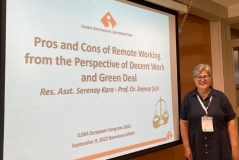
Joint paper of res. asst. Serenay Kara and Prof. Dr. Zeynep Şişli was presented at ILERA European Congress 2022

Dr. Ebru Akduman gave seminars at Niccolo Cusano University, Rome on European Union-Turkey Relations.
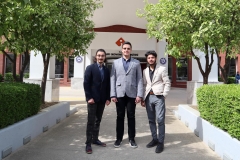
‘Mock trial’ brought an award
Oğuzhan Yıldırım, İnan Bakır and Süleyman Gürkan Emre, students of Faculty of Law, Izmir University of Economics (IUE), won the third prize

They wrote the book of corona law
Izmir University of Economics (IUE) Faculty of Law, which organized a symposium to clarify different issues such as "protection of personal data",





